Unit 1 My Day 复习课件 (共227张PPT)
文档属性
| 名称 | Unit 1 My Day 复习课件 (共227张PPT) |  | |
| 格式 | pptx | ||
| 文件大小 | 51.1MB | ||
| 资源类型 | 试卷 | ||
| 版本资源 | 人教版(PEP) | ||
| 科目 | 英语 | ||
| 更新时间 | 2023-06-06 17:41:59 | ||
图片预览

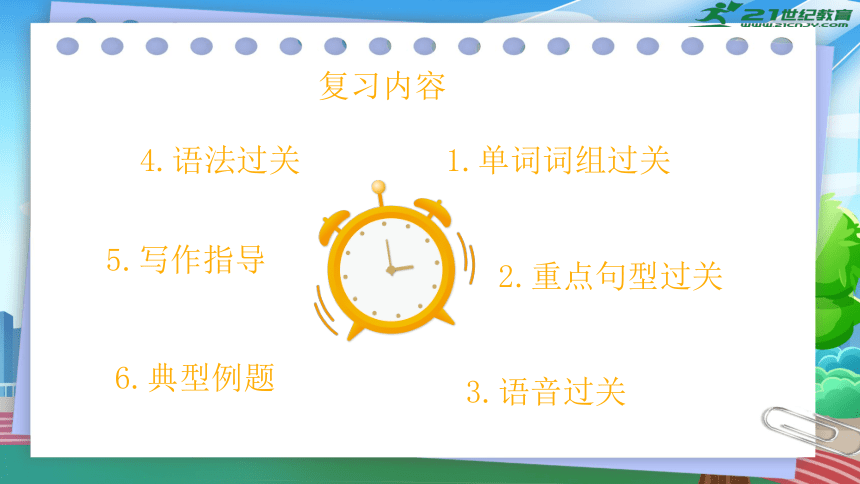
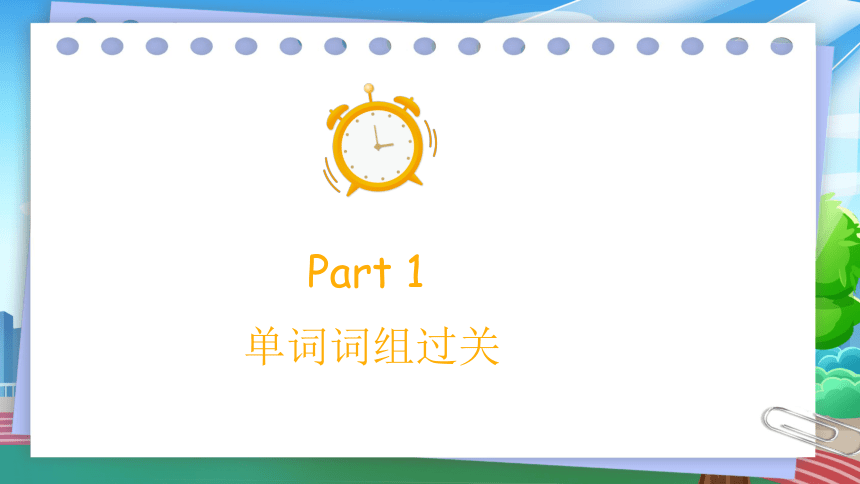
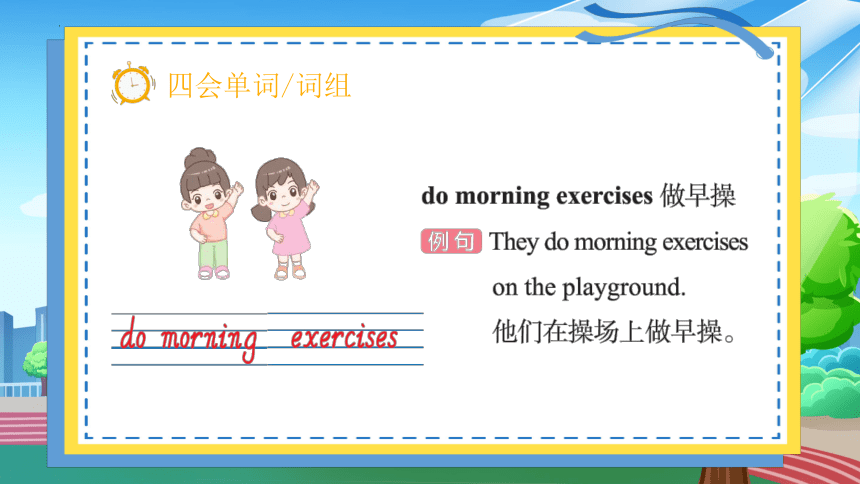
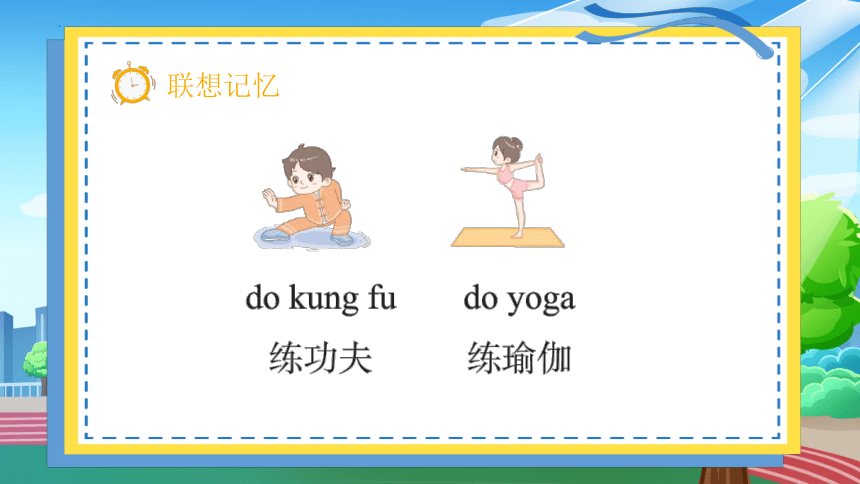
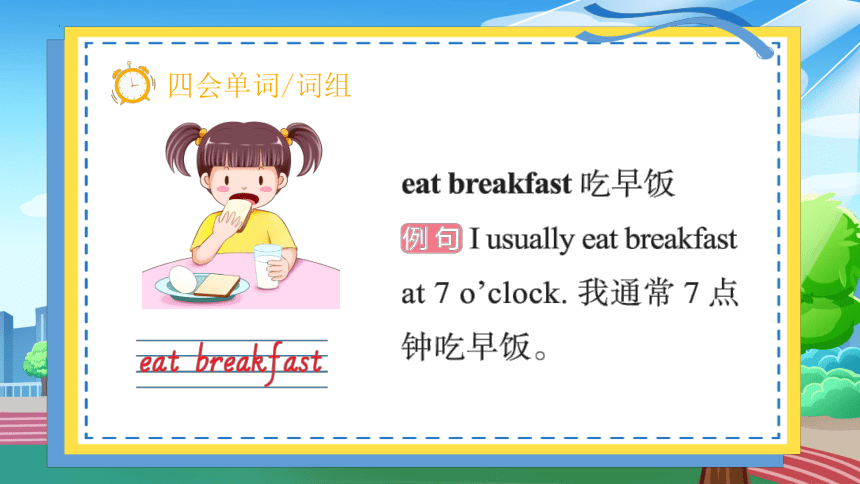
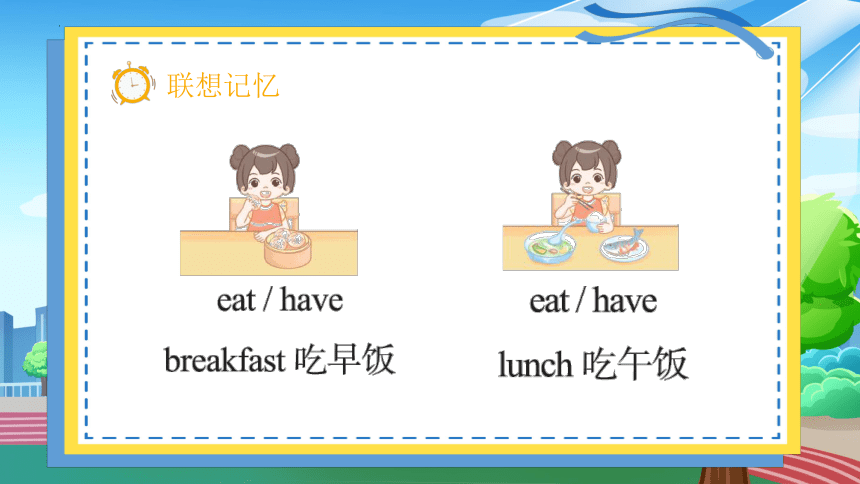
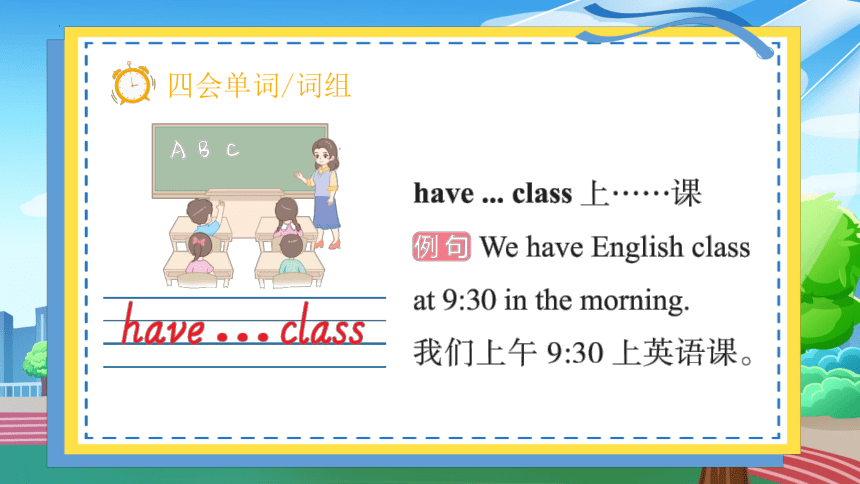
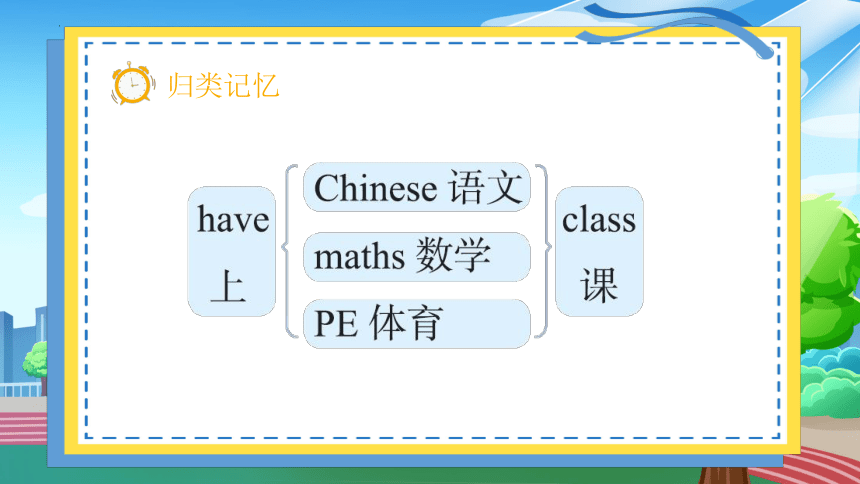
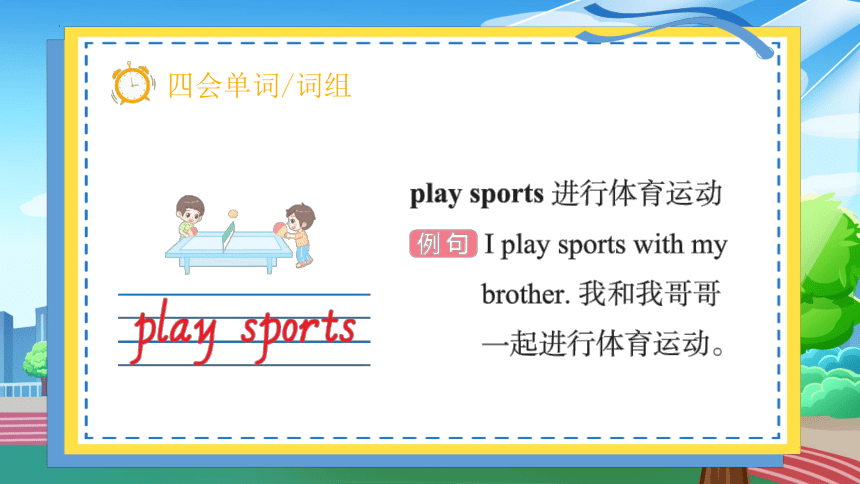
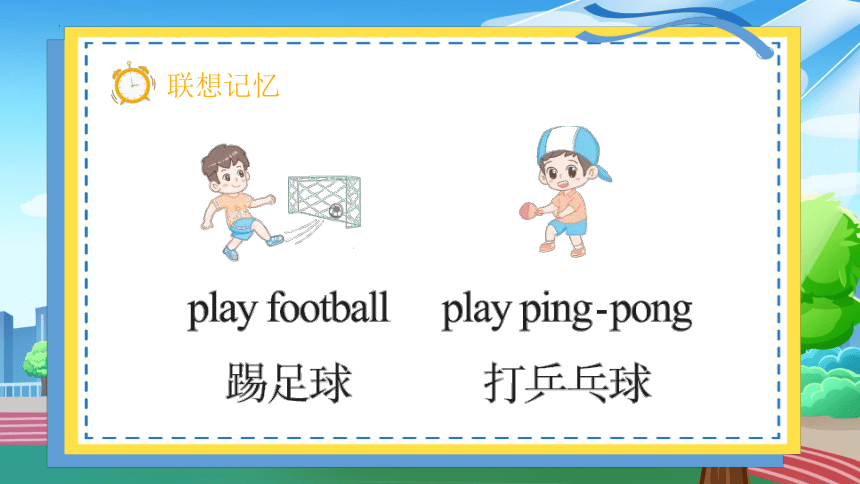
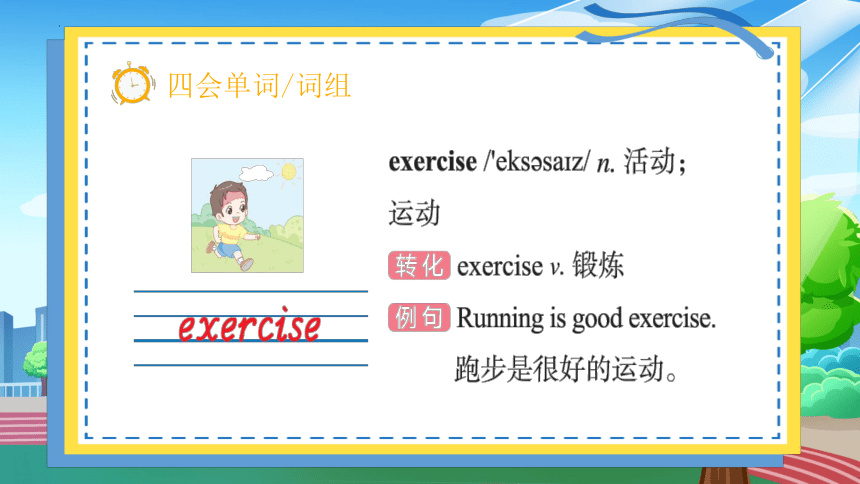
文档简介
(共227张PPT)
人教五下复习课件
主讲教师:
1.单词词组过关
2.重点句型过关
3.语音过关
4.语法过关
5.写作指导
6.典型例题
复习内容
Part 1
单词词组过关
四会单词/词组
联想记忆
四会单词/词组
联想记忆
四会单词/词组
归类记忆
四会单词/词组
联想记忆
四会单词/词组
联想记忆
四会单词/词组
对比记忆
四会单词/词组
四会单词/词组
对比记忆
do morning exercises
eat breakfast
have class
play sports
eat dinner
What’s missing?
eat dinner
do morning exercises
have PE
class
eat breakfast
go to bed
play sports
again
再玩一次
get up
S1:When do you ________
S2:At _______ o’clock.
Ask and answer
四会单词/词组
联想记忆
四会单词/词组
归类记忆
四会单词/词组
联想记忆
四会单词/词组
形近词记忆
四会单词/词组
形近词记忆
归类记忆
clean my room
go shopping
go for a walk
take a dancing class
play sports
eat breakfast
eat dinner
do morning exercises
三会单词
什么时候:__________
完成,结束:__________
开始: ___________
然后:___________
在...之后:________
通常地:___________
为什么:___________
when
finish
start
then
after
usually
购物:__________ 工作:__________
上一个: ___________
听起来好像:___________
还,也:____________
需要:___________
衣服:___________
why
shop
work
last
sound
also
need
clothes
三会单词
机器人:__________
戏剧,剧本:__________
信: ___________
居住:___________
岛:____________
提早:___________
总是:___________
robot
play
letter
live
island
early
山洞:__________
获胜:__________
只,仅仅: ___________
在一起:___________
告诉:____________
很快,不久:___________
收集,采集:___________
always
cave
win
only
together
tell
soon
collect
三会单词
坚果:__________
其他的:__________
把...弄干: ___________
演出,表演:___________
nut
else
dry
show
三会词组
结束课程:_________
返回学校:
__________________
午饭后: __________
吃午/晚饭:
_______________
在...点钟:_________
在家:______________
在西班牙:___________
在晚上:__________
那太晚了:_______________
昨晚: ___________
在周末:_________________
看电视:____________
finish class
go back to school
after lunch
eat lunch/dinner
at...o’clock
That’s too late.
in Spain
at night
at home
last night
on the weekend
watch TV
三会词组
打乒乓球:____________
洗我的衣服:
_______________
做晚饭:____________
很忙:____________
听起来好像:__________
好孩子:____________
play ping-pong
wash my cloth
cook dinner
so busy
sound like
Good girl!
你很忙啊:_______________
住在一个小岛上:
_____________________
洗脸:_______________
每天:_______________
游泳:_______________
You’re so busy.
live on a island
wash my face
every day
go swimming
三会词组
打扫我的山洞:
_______________
擅长:_______________
离开:_______________
从...到...:_______________
把我的坚果弄干:__________
收集坚果:_______________
在太阳下:___________
吃坚果:_______________
有一场演出:__________
弹琵琶:_______________
clean my cave
be good at
get off
from...to...
dry my nuts
collect nuts
in the sun
eat nuts
have a show
play the pipa
三会词组
让我看看/想想:_____________
为什么:_____________
哦,不!:_______________
和我的朋友进行体育运动:______________________
Let me see.
Why
Oh,no!
play sports with my friends
任务一:根据图片提示,补全句子。
(1) They always ________ ________ ________ sat 7:00 a.m.
(2) I often _______ __________ at 7:30in the morning
do morning exercises
eat breakfast
任务一:根据图片提示,补全句子。
(3)【新情境】I ________ science ________ on Tuesdays.
(4) He usually ________ ________ at4:30 p.m.
have
class
plays
football
任务一:根据图片提示,补全句子。
( 5 ) I often ________ ________ ________ on Sundays.
( 6) We usually ________ ________ ________ ________ after supper.
clean my
room
go for a walk
任务一:根据图片提示,补全句子。
( 7 ) I sometimes ________ ___________ with my parents on Saturdays.
( 8) We always ________ ________ __________ class on the weekend.
go
shopping
take a
dancing
任务一:根据图片提示,补全句子。
( 9 ) I __________________ at 7: 00 in
the morning.
( 10 ) We usually ____________________
at 10 o'clock.
eat breakfast
do morning exercises
任务一:根据图片提示,补全句子。
( 11 ) We ___________ at 7 o'clock in the evening.
( 12 ) We ___________ in the playground.
( 13 ) We __________________ on Monday.
eat dinner
play sports
have Chinese class
任务一:根据图片提示,补全句子。
( 14 ) I often ________________ after dinner.
( 15 ) I _____________________ every Sunday.
go for a walk
take a dancing class
任务一:根据图片提示,补全句子。
( 16 ) I usually ________________ with my mother
on the weekend.
( 17 ) I sometimes ________________ on Saturdays.
go shopping
clean my room
任务二:看图, 仿照示例写对话。
示例: —What do you do on the weekend
—I always do my homework.
任务二:看图, 仿照示例写对话。
1. —________________________________
—________________________________
What do you do on the weekend
I often wash my clothes.
任务二:看图, 仿照示例写对话。
2. —________________________________
—________________________________
What do you do on the weekend
I sometimes watch TV.
任务三:读一读, 选出每组中不同类的一项。
( ) 1. A. finish B. usually C. start
( ) 2. A. morning B. night C. late
( ) 3. A. when B. lunch C. dinner
( ) 4. A. Spain B. English C. China
( ) 5. A. work B. eat C. school
B
C
A
B
C
任务三:读一读, 选出每组中不同类的一项。
( ) 1. A. worked B. watch C. play
( ) 2. A. usually B. often C. exercise
( ) 3. A. sound B. why C. what
( ) 4. A. clean B. music C. wash
( ) 5. A. need B. busy C. hard-working
A
C
A
B
A
Part 2
重点句型过关
重点句型
When do you… I usually /often…at …
do morning exercise
eat breakfast
8:00a.m.
重点句型
When do you… I usually /often…at …
have …class
play …sports
eat dinner
6:00p.m.
9:00p.m.
9:00a.m.
What do you do on the weekend
I always/usually /often/sometime … .
go shopping
clean my room
What do you do on the weekend
I always/usually /often/sometime … .
go for a walk
take a dancing class
重点句型
1、询问别人什么时候做某事的句型及回答。
句型结构:
问:When do you+动词短语原形+其他?
(你/你们什么时候做某事?)
答:I/We(+频度副词)+动词短语原形+at+具体时间
(我/我们通常在几点做某事。)
重点句型
例:问:When do you go to bed (你什么时候上床睡觉?)
答:I go to bed at 9:00p.m (我晚上9点上床睡觉。)
注意:当主语是第三人称单数(he,she,it,单个人名或单数名词)时,助动词do要变成does,
句型结构是:When does+主语(第三人称单数)+动词短语原形+其他?
重点句型
2、询问别人周末做什么的句型及回答。
句型结构:
问:What do you do on the weekend
(你周末做什么?)
答:I(+频度副词)+动词(短语)+其他。
重点句型
例:问:What do you do on the weekend
(你周末做什么?)
答:I usually read books. (我通常看书。)
注意:当主语是第三人称单数(he,she,it,单个人名或单数名词)时,助动词do要变成does,
句型结构是:What does+主语(第三人称单数)+do+on the weekend
任务一:背诵默写下列句型
1.When do you finish class in the morning
你们上午的课到几点结束?
2.We finish class at 1 o’clock . 我们一点钟结束上午的课。
3.What do you do on the weekend 你周末做什么?
4.I often watch TV and play ping-pong with my father .
我经常看电视,也常和我爸爸一起打乒乓球。
任务一:背诵默写下列句型
5.Classes start at 3 o’clock. 课程在三点开始。
6.That’s too late. 那太晚了。
7.Why are you shopping today 为什么今天你来购物。
8.That sounds like a lot of fun. 那听起来很有趣。
9.I’m also hard-working,I usually wash my clothes.Sometimes I cook dinner.
我也很勤快,我通常洗我的衣服,有时我做晚饭。
任务二:选词填空, 补全句子。
1. I usually get up _______ (at/in) seven o’clock.
2. We go back to school at 2: 00 _______ (after/on) lunch.
点拨:表示“在几点”介词用at。
at
点拨:after lunch意为“午饭后”。
after
任务二:选词填空, 补全句子。
3. Classes _______ (start/finish) at 8: 00 in the morning.
4. People usually eat dinner at 9: 30 or 10: 00 _______ (in/at) Spain.
点拨:因为时间状语是“早上8点”, 所以是“开始上课”。
start
点拨: “in +国家名称” 表示“在……国家”。
in
任务二:选词填空, 补全句子。
5. —_______ (Where/When) do you usually go to bed
—I usually go to bed at 9: 30 p. m.
点拨:询问时间用when。
When
任务三:读一读, 判断下列句子与图片是(Y) 否(N) 相符
( ) 1. I usually eat lunch at 11: 30 in the morning.
( ) 2. We eat dinner at 6: 30 in the evening.
Y
N
任务三:读一读, 判断下列句子与图片是(Y) 否(N) 相符
( ) 3. I usually go to bed at 7: 00.
( ) 4. I get up at 9: 00. That’s too late.
N
N
任务四:【学科素养 表达与交流】
选择合适的选项补全对话。
(有两个多余选项)
Tom: Hi, Lucy! Can I ask you some questions
Lucy: Sure, please.
Tom: 1. _______
A. I usually have some cake and a glass of milk.
B. What time do you usually get up on Wednesdays
C. When do you play games
D. I get home at five twenty.
E. Class begins at eight o’clock.
F. I have lunch at school.
G. When do you get home
A
任务四:【学科素养 表达与交流】
选择合适的选项补全对话。
(有两个多余选项)
Tom: Hi, Lucy! Can I ask you some questions
Lucy: Sure, please.
Tom: 1. _______
A. I usually have some cake and a glass of milk.
B. What time do you usually get up on Wednesdays
C. When do you play games
D. I get home at five twenty.
E. Class begins at eight o’clock.
F. I have lunch at school.
G. When do you get home
B
Lucy: Well, I live near
my school, so I get up
at a quarter to seven.
Tom: Do you have
breakfast at home
Lucy: Yes. 2. _______
Tom: When do you go to school
A. I usually have some cake and a glass of milk.
B. What time do you usually get up on Wednesdays
C. When do you play games
D. I get home at five twenty.
E. Class begins at eight o’clock.
F. I have lunch at school.
G. When do you get home
B
Lucy: 3. _______ So
I go to school at seven
forty-five. We have
four classes in the
morning and three in
the afternoon. Then we
play sports at about
four in the afternoon.
A. I usually have some cake and a glass of milk.
B. What time do you usually get up on Wednesdays
C. When do you play games
D. I get home at five twenty.
E. Class begins at eight o’clock.
F. I have lunch at school.
G. When do you get home
E
Tom: 4. _______
Lucy: I leave the
school at five past five.
5. _______
A. I usually have some cake and a glass of milk.
B. What time do you usually get up on Wednesdays
C. When do you play games
D. I get home at five twenty.
E. Class begins at eight o’clock.
F. I have lunch at school.
G. When do you get home
G
D
Diandian: Hi,
Huahua. 1.____
Huahua: Because
my father and my
mother go to work. 2. ____
A. And I often help my mother clean the room.
B. What do you do on the weekend
C. Why are you washing clothes today
D. That sounds like a lot of fun.
E. I want to help them.
C
E
Diandian: You are a good
girl. 3._____
Huahua: I often play
sports with my father.
Diandian: 4. _____
Huahua: Yes. 5. _____
Diandian: You’re so helpful.
A. And I often help my mother clean the room.
B. What do you do on the weekend
C. Why are you washing clothes today
D. That sounds like a lot of fun.
E. I want to help them.
B
D
A
任务五:单项选择
( ) 1. My mum worked last night. So I am _______ today.
A. shop B. shopping C. shops
B
点拨:“am+ 动词的-ing 形式” 是现在进行时的结构。故选B。
任务五:单项选择
( ) 2. I often play ping-pong _______ the weekend.
A. on B. in C. of
A
点拨:on the weekend 为固定短语, 意为“在周末”。故选A。
任务五:单项选择
( ) 3. I usually play music after school. _______ I play sports.
A. So B. Sometimes C. sometimes
B
点拨:选项位于句首, 首字母需要大写, 首先排除C 项。结合第一句句意“我通常在放学后演奏音乐。”可知, 有时候“我” 做运动。so 表示“因此, 所以”, 与句意不符。故选B。
任务五:单项选择
( ) 4. You need a robot _______ you.
A. help B. helping C. to help
C
点拨:need sb. to do sth. 意为“需要某人做某事”。故选C。
( ) 5. I usually _______ my clothes after dinner.
A. wash B. watch C. water
点拨:wash (my) clothes 意为“洗(我的) 衣服”, 为固定短语。故选A。
A
任务五:为下列句子选择正确的图片。(填序号)
( ) 1. My mother often cooks dinner for us. She is helpful.
D
任务五:为下列句子选择正确的图片。(填序号)
( ) 2. I usually play ping-pong with my friend.
( ) 3. I often do my homework in the evening.
B
A
任务五:为下列句子选择正确的图片。(填序号)
( ) 4. We go shopping every weekend.
( ) 5. Sometimes I play music on the weekend.
C
E
任务六:【学科素养 信息提取】读短文, 完成下列各题。
I’m Danny. I am very busy on the weekend. I often watch TV and play football on Saturdays. Sometimes I go shopping on Saturdays. I often go for a walk with my mother and father on Sundays. I have a lot of fun. I am also hard-working. I always do my homework on Sundays. I usually take a drawing class and clean my room on Sundays.
任务六:【学科素养 信息提取】读短文, 完成下列各题。
(一) 按照动作发生的频率高低给下列图片排序。
4
2
3
1
任务六:【学科素养 信息提取】读短文, 完成下列各题。
(一) 按照动作发生的频率高低给下列图片排序。
点拨:频率副词always 意为“总是; 一直”, 指动作发生频率为100%; usually 意为“通常”, 频率为90%; often 意为“经常; 常常”, 频率为70%; sometimes 意为“有时; 不时”, 频率为50%。
(二) 根据短文内容, 完成以下活动安排表。
Danny’s weekend
On Saturdays
watch TV play football
1. _____________
On Sundays
2. _____________
3. _____________
4. _____________ _____________
go shopping
go for a walk
do his homework
take a drawing class
clean his room
任务七:【立德树人·时间管理】阅读短文, 完成下列各题。
Hi, I’m Tom. Today is Sunday. I don’t go to school. I get up at 7: 00 in the morning. Then I eat breakfast at 7: 30. I do my homework at 8: 00 a. m. After I finish my homework, I read a book at ten o’clock. In the afternoon, I play football with my friends at 3: 00. In the evening, I watch TV at 8: 00. At 9: 30, I go to bed. This is my day.
任务七:【立德树人·时间管理】阅读短文, 完成下列各题。
(一) 根据短文内容, 判断句子正(T) 误(F) 。
( ) 1. Tom goes to school today.
( ) 2. Tom reads a book at 10: 00 a. m.
( ) 3. Tom watches TV at eight o’clock in the evening.
F
T
T
(二) 根据短文内容, 完成以下表格。
Time(时间) Activities(活动)
1. ______________ get up
7: 30 a. m. 2. _____________
8: 00 a. m. 3. _____________
4. ______________ play football
5. ______________ go to bed
7: 00 a. m.
eat breakfast
do homework
3: 00 p. m.
9: 30 p. m.
Part 3
语音过关
Let’s spell
cl
clean
clock
class
clever
cloudy
gl
plate
eggplant
please
play
plane
发音要领
/kl/
/k/的发音类似汉字“柯”和汉语拼音“K”,不但不能振动声带。/l/的发音和汉语拼音“l”音很相似。拼读/kl/时,先轻而短促地拼读
/k/音,再自然紧密地衔接到/l/音。
发音要领
/pl/
/p/的发音类似汉字的“泼”。/l/的发音和汉语拼音“l”音很相似。拼读/pl/时,先轻而短促地拼读/p/音,再自然紧密地衔接到
/l/ 音。
play
clean
plate
clock
plant
clever
class
please
cloudy
Let’s spell.
pl
ease
ate
ay
ant
cl
Let’s spell.
cl
ass
ever
ean
ock
ick
ane
ap
click
um
Read, Choose and Write: cl/pl
ose
close
egg ant
eggplant
clap
plane
plum
Read and Classify
pl
cl
1.class
2.please
3.clean
4.clock
5.player
6.clap
7.playground
8.plate
9.clothes
10.clever
11.eggplant
12.cloudy
2、5、7、8、11
1、3、4、6、9、10、12
任务一:看图,写出含有 pl或 cl 的单词,完成子。
(1 ) This is a ________.
(2)[新情境] I have a cooking ______
in the afternoon.
(3) Please pass me a ________.
clock
class
plate
4. This is an ________ . It is purple.
5. There is some fish on the ______ .
6. Look at the ________ . What time
is it
eggplant
plate
clock
4. The boy is very ________ .
5. We have English ________ every Tuesday.
clever
class
任务二:选出每组中画线部分发音不同的一项。
( ) 1. A. clean B. class C. people
( ) 2. A. clock B. play C. please
( ) 3. A. clever B. classroom C. player
( ) 4. A. eggplant B. clothes C. plane
( ) 5. A. cloudy B. plate C. clear
C
A
C
B
B
任务三:读句子, 判断画线部分读音是(Y) 否(N) 相同。
( ) 1. Please pass me the plate.
( ) 2. We usually clean our classroom after school.
( ) 3. It is cloudy and cold.
( ) 4. Buy some clothes at 9 o'clock.
( ) 5. Don't play. Please plant a tree.
Y
Y
N
Y
Y
任务四:读句子, 判断画线部分读音是(Y) 否(N) 相同。
( ) 1. Please pass me the plate.
( ) 2. We usually clean our classroom after school.
( ) 3. It is cloudy and cold.
( ) 4. Buy some clothes at 9 o'clock.
( ) 5. Don't play. Please plant a tree.
Y
Y
N
Y
Y
任务五:【学科素养 感知与积累】读一读, 完成下列各题。
It is four o’clock. Class is over. Hurry up, boys and girls! Time to clean our classroom. Close the door and water the plants. Wow! It’s clean and nice. You’re great! You’re helpful! Clap hands for yourselves. Let’s go to the playground to play!
(一) 找出与所给单词画线部分发音相同的单词。
1. cloud:
_________________________________
2. please:
_________________________________
o’clock; Class; clean; classroom; Close; Clap
plants; playground; play
(二) 根据文章内容选择正确答案。
( ) 1. Class is over at _____.
A. B.
B
( ) 2. Time to clean our _____.
A. B.
A
( ) 3. Water the _____, please.
A. B.
B
Part 4
语法过关
知识点 1
When do you finish class in the morning
We finish class at 1 o'clock.
When do you...
询问对方做某事的时间或从事某一活动的时间。
When do you go to bed in the evening
I usually go to bed at 9.
问句句型:
When+do/does+主语+动词原形+其他?
答语句型:
主语+频度副词+动词+at+时间点
举一反三:
When do you have class in the morning
你们上午几点上课
-We have class at 8:10.
我们八点十分上课。
-When do you usually eat breakfast
你通常几点吃早饭
I usually eat breakfast at 7:00.
我通常七点吃早饭。
易错点提示
1.在口语中也可以直接用“At+时间点 .”来回答。
例句:
-When do you go to bed
你什么时候上床睡觉
-At 9 o'clock. 九点。
易错点提示
2.当主语为第三人称单数时,助动词用 does ;回
答时,答语中的动词要体现动词的第三人称单数形式。
例句: -When does your brother go to work
你哥哥什么时候去上班
-He usually goes to work at 7:00 in the
morning. 他通常在早上7点去上班。
典型例题
情景选择
你想知道新来的朋友 Pedro 晚上什么时候睡觉,你会问:
A. When do you go to bed
B. When do you get up
典型例题
单项选择。
(1)--___do you get up
--I get up at 6:00 in the morning.
A.When B.What C.Where
典型例题
(2) --When ______ Sarah go back to sehool
--At 1 o'clock.
A. do B.does C.is
(3) --When does your brother go to work
--He ______ to work at 7:30.
A.go B.goes C.going
典型例题
(4) --When does your friend go to bed
-- ______ 10:30 in the evening.
A. In B.At C.On
知识点 2
When 与 What time 的区别:
--What time do you go to school
--I go to school at half past seven.
What time 翻译为“几点”问的是具体的时间,回答要具体到几点钟,注意在点钟前用介词 at
知识点 2
When 与 What time 的区别:
-When does he take a shower
-He takes a shower in the morning.at 6 o'clock in the morning.
when 翻译为“何时”,回答既可以是具体的时间,也可以是不具体的时间,如:in the morning, last year,in 1998 等范围大的时间。
典型例题
选择合适的疑问词填空
A. What time B. When
(1) -- ______is her birthday
--On February lst.
(2) --______is it
--It's five o' clock.
B
A
典型例题
情景选择
Pedro 的父母将会来中国看望他。Pedro 想知道他们哪一天会来,他会问:
A. What time will you come to China
B. When will you come to China
知识点 3
finish 的用法:
finish+名词/动词的-ing形式
完成某事/完成做某事
例句:When do you finish playing sports in the morning
典型例题
单项选择。
(1)--When do you finish______ every day
--At 8:30.
A.read B.write C.reading
(2) My friend Robin makes me finish______every day.
A. my homework B. do my homework
知识点 4
at 的用法:
at 意为“在”,用于准确的时间“几点几分”之前
例句:I usualy go to bed at 9:30.
我通常九点半上床睡觉。
用法 意义 例子
on on+星期名称 on+具体日期 on+具体某天上午/下午 on +具体某一天 on Monday
on May 1st
on Saturday afternoon
at at+具体时刻 at+具体某一时刻 at 8 o’clock
at noon
in in+月份/年份/ 上午/下午/晚上 in+大时间 in spring
in the morning
时间介词的用法盘点
典型例题
选择正确的介词填空。(其中一个介词可选两次)
in at on
(1)I play sports ______Saturday.
( 2) I go shopping _________ the afternoon.
(3)I go fishing _________Sunday afternoon.
(4) We usually have dinner______ 7 o'clock
on
in
on
at
知识点 5
go back to的用法:
go back to+地点名词(短语)表示“返回某地”
短语 go back to school 返回学校
go back to China 返回中国
例句:We usually go back to school in September.
我们通常九月份返回学校。
易错点提示
back 后接地点副词时通常不加 to。
例如: go back home 回到家
go back here 回到这儿
go back there 回到那儿
典型例题
单项选择
(1) --When do you go back______Beijing
--On Tuesday.
A. to B.at
(2) --When do you go back ______ here to pick me up, Dad
--At 5 o'clock.
A. to B./
知识点 6
时间表达法小结:
顺读法
整点:钟点数+o’clock
非整点:钟点数+分钟数
nine o’clock
ten ten
逆读法
30分钟以内:分钟数+past+钟点数
30分钟:half past +钟点数
超过30分钟:(60-分钟数)+to+(钟点数+1)
15分钟:a quarter past +钟点数
45分钟:a quarter to +(钟点数+1)
1
2
3
4
5
6
7
8
9
10
11
12
five past
ten past
a quarter past
twenty past
twenty-five past
half-past
twenty-five to
twenty to
a quarter to
ten to
five to
o’clock
TO PAST
TO PAST
1
2
3
4
5
6
7
8
9
10
11
12
It’s one o’clock
TO PAST
1
2
3
4
5
6
7
8
9
10
11
12
It’s five past nine.
TO PAST
1
2
3
4
5
6
7
8
9
10
11
12
It’s a quarter past seven.
TO PAST
1
2
3
4
5
6
7
8
9
10
11
12
It’s half past three.
TO PAST
1
2
3
4
5
6
7
8
9
10
11
12
It’s twenty five to eight.
TO PAST
1
2
3
4
5
6
7
8
9
10
11
12
It’s a quarter to five.
Try again!
Try again!
Well done!
It’s three o’clock.
It’s five o’clock.
It’s nine o’clock.
next
Try again!
Try again!
Well done!
It’s ten past ten.
It’s ten past two.
It’s ten to two.
next
Try again!
Try again!
Well done!
It’s half past nine.
It’s half past eight.
It’s half to nine.
next
Try again!
Try again!
Well done!
It’s twenty past eleven.
It’s twenty past ten.
It’s twenty to eleven.
Try again!
Try again!
Well done!
It’s quarter to nine.
It’s quarter past nine.
It’s quarter to three.
Try again!
Try again!
Well done!
It’s five to nine.
It’s quarter to eleven.
It’s five past nine.
知识点 6
频度副词小结:
频度副词:表示动作发生的次数,频率的副词叫做频度副词。
例句:Usually at 9:30 or 10 o’clock.
频度副词
always 总是 100%
often 经常 60%
hardly ever= seldom 几乎不 10%
never 从不 0%
usually 通常 80%
高
低
sometimes 有时 30%
always
含义:一直,总是
频度图例:
例句:I always do my homework after dinner.
我总是在晚饭后做作业。
usually
含义:通常
频度图例:
例句:We usually go shopping on weekends.
我们通常周末去购物。
often
含义:经常
频度图例:
例句:They often play sports on the playground.
他们经常在操场上做运动。
Sometimes
含义:有时
频度图例:
例句:My sister sometimes does morning exercise
at home.
我姐姐有时在家里做早操。
hardly ever=seldom
含义: 几乎不
频度图例:
例句:I hardly ever play computer games on Monday.
我周一几乎不玩电脑游戏。
never
含义:从不
频度图例:
例句:I never go to school by taxi.
我从不坐出租车去学校。
易错点提示
频度副词在句子中一般位于实义动词前,be动词
或情态动词之后,usually和 sometimes 可以放在句首,
有强调的作用。
例句:-Usually I read books in the park on the weekend.
通常我周末在公园读书。
-Sometimes I go shopping.
有时候我去购物。
典型例题
根据表格内容填空。
What do you do on the weekend Tom Amy Sam
clean my room ○ □ △
play football △ ○
do my homework □
take a dancing class ◇ ○
○ often □ always △ sometimes ◇ never
典型例题
Tom: I often________________. Sometimes I_____________.I________take a dancing class.
Amy:I________clean my room and do my homework. I________ take a dancing class.
Sam:I often____________.__________I clean my room.
clean my room
play football
never
always
often
play football
Sometimes
典型例题
根据汉语提示填空。
(1)She_____________(一直,总是) sleeps after lunch.
(2)My brother___________( 通常) plays computer games on weekends.
(3)They_________(经常) visit museums(参观博物馆 ) every year.
(4)My mum_____________ (有时) likes to make up(化妆).
(5)The boy ________(从不)does housework at home.
always
usually
often
sometimes
never
知识点 7
or的用法:
or :conj. 连词,用于连接并列的单词、短语或句子,意为“或者”,表示不确切、模糊的陈述。
例句:You can have dinner at home or go to the restaurant.
你可以在家吃晚饭或者去饭店吃。
or的其他用法:
or
表示一种否定的条件,意为 “否则”
Hurry up,or we’ll be late.
快一点,否则我们要迟到了。
用于否定句中
代替 and
He is not clever or friendly.
他既不 聪明也不友好。
用在选择疑问句中连接被选择的对象,意为“或
Is he a doctor or a
teacher
他是一名医医生;还是一名教师
典型例题
选一选。
(1) She will come here at 4 _____5 o'clock.
A. and B.or
( 2) Is she a teacher_____a saleswoman(售货员)
A.or B.and
B
A
典型例题
选一选。
( 3 ) I love my father_____my mother.
A. or B.and
( 4) Give this book to me,_____I will not let you go!
A.or B.so
B
A
知识点 8
play的用法小结:
play 搭配球类或棋类时不用the,而搭配乐器时要用the
play
play+球类/棋类/游戏
play+the+乐器
play+with+人/物
play tennis
play games
play chess/cards
play football
play basketball
play volleyball
play the piano
play the violin
play the guitar
play with Mike
play with dogs
play with snow
play 用法:
play的用法
play+球类/棋类/牌类
play+the+乐器
play+with+人/物
play football
play chess
play basketball
play cards
play the piano
play the violin
play with snows
play with cats
play with Mikes
典型例题
选择填空。
A. the B./
1.Ioften play _____football with my friends on the weekend.
2.My sister can play____guitar.
3.Tom usually plays____chess with his grandpa after dinner.
B
A
B
典型例题
英汉互译。
(1)我周末经常和我的朋友们打乒乓球。
_____________________________________________
(2)我会弹琵琶。
________________________________
I often play ping-pong with my friends on the weekends.
I can play the pipa.
典型例题
英汉互译。
( 3 ) I will play the piano for my mum.
________________________________
(4) I like winter because I can play with snow.
________________________________
我喜欢冬天因为我喜欢玩雪。
我将要弹奏钢琴给我的妈妈听。
知识点 9
Why is/are ...doing ... 询问某人在做某事的原因
句型:Why+be+主语+动词ing+其他。
Why:为什么,引导的疑问句用来询问别人做某事的原因。
例句:Why are you crying 你为什么在哭?
Why are you shopping today
易错点提示
be+动词的-ing形式表示动作正在进行,
be 动词要随着主语的变化而变化:
当主语是第三人称单数时,be 动词用 is;
当主语是第二人称或其他复数人称时,
be 动词用 are。
典型例题
我会选。
(1) --Why____he running to school
--He will be late for school.
A. be B.is C.are
(2) --Why ____ you cooking today
--My mum isn't at home.
A.be B.is C. are
B
C
知识点 10
一般过去时:表示过去某个时间里发生的动作或所处的状态。动词要用一般过去式。
例句:I played basketball last night.
My mom worked last night.
情况分类 变化规律 例词
一般情况 词尾+ed work→ worked
play→played
以不发音e结尾 词尾+d live→lived
move→moved
以辅音字母+y结尾 把y改为i+ed study→studied
try→tried
辅元辅结构的重读闭音节 双写词尾辅音字母+ed stop→stopped
plan→planned
不规则动词 go→went make→made get→got buy→bought come→came fly→flew 典型例题
我会选。
吴彬彬想和张鹏说他上周末打篮球了这件事情时,他是这样说的:
A. I play basketball on the weekend.
B. I played basketball last weekend.
C. I am playing basketball with John now.
知识点 11
What do/does ...do... 询问某人在特定时间做什么?
--So what do you do on the weekend
--I often watch TV and play pingpong with my father.
What does she do on Sarturdays
She often washes clothes
问句句型:
What+do/does+主语+do+时间短语?
答语句型:
主语+频度副词+动词+其他
易错点提示
1.问句句型中,当主语为第三人称单数时,助动词
用 does。
2.答语句型,也可用于介绍某人在某个时间做什么。
当主语为第三人称单数时,动词也要用第三人
称单数形式。
典型例题
我会选。
(1)--What ____ you do on the weekend
--I play football with my brother.
A. do B. are
(2)--What ____ he do on the weekend
--He goes camping with his family.
A. do B. is C. does
A
C
典型例题
我会选。
(3)--What do they____on Saturdays
--They often play football.
A. do B.are C.does
(4)-What does Mike do on Sundays
-He usually___ pictures.
A.draw B.draws C.drawing
A
B
知识点 12
sound like 的用法:
“听起来像”后面可以跟名词或动名词
--That sounds like a lot of fun.
--Yes,I’m also hard-working.
We’ll have an English party.
我们将会举办一个英语派对。
That sounds like a lot of fun.
那听起来好像很有趣。
典型例题
我会选。
--We often go swimming in summer.
--________________.
A. I think so.
B.That sounds like a lot of fun.
B
知识点 13
a lot of 的用法:
a lot of指很多,既可与可数名词连用,也可与不可数名词连用。同义词组是 lots of。
而 many 与可数名词复数连用;
much 与不可数名词连用。
例 句:
There are a lot of animals in the zoo.
在动物园有很多动物。
There are not many animals in the zoo.
在动物园没有很多动物。
典型例题
我会替换画线的词。
A. many B.much
(1) She has a lot of money, so she is rich.
( 2) There are a lot of trees in the park.
B
A
“也”有说法:
也
also
too
either
用于句中,肯定句
用于句末,肯定句或疑问句
用于句末,否定句
知识点 14
典型例题
选一选。
(1) Surfing the internet is_____interesting, but it's a waste of time.
A.too B.also C.either
( 2) I like playing basketball. My friend Li Ming likes playing basketball,_____.
A.also B.either C.too
B
C
典型例题
选一选。
( 3) My brother doesn't like the apples.Me________·
A.also B.either C.too
C
知识点 15
--My mum worked last night.So I’m shopping today.
我妈妈昨天晚上工作了,所以今天我来购物。
--You’re so busy! You need a robot to help you!
你很忙啊!你需要一个机器人来帮你!
--Good girl! So What do you do on the weekend
好孩子,那么你周六做什么?
so 的用法:
在这段对话中,so出现了三次,而且三个意思都不同。
用法 例句
连词,表示因果关系 “因此,所以” My mum worked last night.So I’m shopping today
引出后面的问题或建议 “那么” Good girl! So What do you do on the weekend
副词,用来代替整句话或者某一情况,“这样,如此”,常与 think,hope,say,be afraid,much 等词连用 I think so. 我认为是这样。
I hope so. 我希望是这样。
典型例题
你能译出 so 在下列句子中的意思吗
(1) My mum works this morning So my dad takes me to school.
(2)-Pandas live in China.
-I think so.
(3) There is so much corn in the house.
(4) -I can clean the room and wash clothes.
-You are helpful. So what else can you do
所以
这样,如此
如此
那么
知识点 15
need的用法
need+名词 需要某物
I need a book.
need+doing 需要被做某事
These plants need watering.
need+动词原形 需要做某事
I need to buy a new bike.
典型例题
选一选。
(1)I need an_______in the rainy day.
A. book B.umbrella
(2) He is so hungry. He needs_______some food.
A. eat B. to eat
B
B
知识点 16
go,play,have,do的常见结构的小结:
动词 结构 用法 例词
go go+动词ing 进行娱乐或体育活动 go fishing
go climbing
play play+球类名词 打/踢...球 play basketball
play+the+乐器 弹奏...乐器 play the piano
知识点 16
动词 结构 用法 例词
do do+(the)+动词ing 常用来表示日常活动 do the dishes
do homework
have have+三餐 吃某顿饭 have lunch
have+食物/饮料 吃/喝 have some bread
have+学科类名词 上...课程 have maths class
Part 5
写作指导
本单元以“了解学校和社会生活中活动,合理安排学习生活和日常活动”为话题,要求同学们能够描述自己或他人的日常作息和周末活动安排。
主题速览
题目:以“My weekend”为题写一篇短文,介绍一下你是怎样过周末的。要求不少于5句话。
题目
写作指导
三步法叙述周末活动
1.总体介绍
2.按时间顺序描述
3.表达心情
三步法描述
周末活动
1.总体介绍
总体概括周末活动的状况,一个充实的周末,可以是周末两天,也可以是一天。
例句:This Sunday,I’m very busy.
I had a busy/wonderful/happy/great/enjoyable
weekend.
三步法描述
周末活动
2.按时间顺序描述
分别介绍周六周日上午或下午的活动安排及细节。
表示时间的词汇:in the morning/afternoon/evening
on the weekend on Sunday/Saturday
2.按时间顺序描述
描述活动的词汇:
have / eat breakfast / lunch / dinner 吃早饭/午饭/晚饭
take a dancing class 上舞蹈课 have a painting class 上绘画课 do morning exercises 做早操 go for a walk 去散步
go shopping 去买东西;购物 do homework 写作业
2.按时间顺序描述
描述活动的词汇:
watch TV 看电视 wash my clothes 洗衣服
read books 读书 play football 踢足球
play sports 做体育运动 listen to music 听音乐
play ping-pong 打乒乓球 draw pictures 画图画
2.按时间顺序描述
描述活动的词汇:
clean my room 打扫我的房间 do some shopping 去购物
do housework 做家务 play games 玩游戏
have a football/basketball class 有一节足球/篮球课
go swimming 去游泳 finish class 上完课
三步法描述
周末活动
3.表达心情
最后总结一下本周末过得怎么样,并表达热爱生活的感情。
例句:What a busy day !And I like this Sunday!
My weekend
I’m very busy on the weekend. On Saturday, I usually play sports in the morning. In the afternoon, I usually do my homework. And on Sunday morning, I usually visit my grandparents. Sometimes I do some reading. In the afternoon, I often play soccer with my friends. In the evening, I often watch TV with my parents at home. I have a good time.
范文1
我的周末
在周末我很忙。在周六上午,我通常进行体育运动。在下午,我通常做作业。在星期天上午,我通常去看望我的外祖父母。有时我也读书。在下午,我经常和朋友踢足球。在晚上我经常和我的父母在家里看电视。我玩得很开心。
译文
A busy Sunday
This Sunday I'm very busy. I get up early as usual. I have breakfast at seven fifteen. It's very healthy. In the morning, I clean my room. Then I go shopping with my mum in a supermarket. There is a lot of fruit in it. Thefruit is very fresh. I like apples best.
范文2
After lunch, I have a nap at home. In the afternoon, I have a painting class. I like painting because I can draw something I want. And I'm good at drawing animals.
When I finish my painting class, I go to a book shop to read some books.
范文2
I go back home for dinner at a quarter past six. Then I go for a walk busy. I get up early with my mum. At 9 p.m., I go to bed.
What a busy day! And I like this Sunday!
范文2
一个忙碌的星期天
这个星期天我非常忙。我像往常一样很 早起床。我在 7:15 吃早餐。早餐是非常有益于健康的。上午,我打扫自己的房间。然后和我妈妈去超市购物。超市里有很多儿水果。水果很新鲜。我最喜欢苹果。
吃完午饭,我在家小睡一会儿。下午,我上了一节绘画课。我喜欢绘画因为我能画一些我想要画的东西。并且我擅长画动物。
上完绘画课,我去书店读了一些书。在6:15 我回家吃晚饭。然后和我妈妈去散步。晚上9点,我上床睡觉。
多么忙碌(充实)的一天!我喜欢这个星期天!
译文
小作者选取了周末的其中一天进行写作。文章开头介绍“我”的一个充实的星期天按照这一天时间的先后顺序描述“我”的一系列活动,并表达了“我”的想法和感情,最后文章点题“多么忙碌的一天”,首尾呼应,表达了我对生活的热爱。全文运用了一般现在时态,并正确运用了一些表达时间的短语。全文结构清晰,表达流畅,是一篇很好的习作。
点评
以“My Weekend”为题写一篇小短文,介绍你平时是怎样过周末的。
要求:1.条理清晰,语法正确。
2.书写规范、认真。
3.不少于50个单词。
小练笔
My Weekend
I’m very busy on the weekend. On Saturday, I often study English in the morning and do my homework in the afternoon. And I often play sports. On Sunday, I always visit my grandparents in the morning and do some reading in the afternoon. In the evening, I often watch TV with my parents. At that time, we can talk with each other and say something interesting. We often have a good time.
范文
人教五下复习课件
主讲教师:
1.单词词组过关
2.重点句型过关
3.语音过关
4.语法过关
5.写作指导
6.典型例题
复习内容
Part 1
单词词组过关
四会单词/词组
联想记忆
四会单词/词组
联想记忆
四会单词/词组
归类记忆
四会单词/词组
联想记忆
四会单词/词组
联想记忆
四会单词/词组
对比记忆
四会单词/词组
四会单词/词组
对比记忆
do morning exercises
eat breakfast
have class
play sports
eat dinner
What’s missing?
eat dinner
do morning exercises
have PE
class
eat breakfast
go to bed
play sports
again
再玩一次
get up
S1:When do you ________
S2:At _______ o’clock.
Ask and answer
四会单词/词组
联想记忆
四会单词/词组
归类记忆
四会单词/词组
联想记忆
四会单词/词组
形近词记忆
四会单词/词组
形近词记忆
归类记忆
clean my room
go shopping
go for a walk
take a dancing class
play sports
eat breakfast
eat dinner
do morning exercises
三会单词
什么时候:__________
完成,结束:__________
开始: ___________
然后:___________
在...之后:________
通常地:___________
为什么:___________
when
finish
start
then
after
usually
购物:__________ 工作:__________
上一个: ___________
听起来好像:___________
还,也:____________
需要:___________
衣服:___________
why
shop
work
last
sound
also
need
clothes
三会单词
机器人:__________
戏剧,剧本:__________
信: ___________
居住:___________
岛:____________
提早:___________
总是:___________
robot
play
letter
live
island
early
山洞:__________
获胜:__________
只,仅仅: ___________
在一起:___________
告诉:____________
很快,不久:___________
收集,采集:___________
always
cave
win
only
together
tell
soon
collect
三会单词
坚果:__________
其他的:__________
把...弄干: ___________
演出,表演:___________
nut
else
dry
show
三会词组
结束课程:_________
返回学校:
__________________
午饭后: __________
吃午/晚饭:
_______________
在...点钟:_________
在家:______________
在西班牙:___________
在晚上:__________
那太晚了:_______________
昨晚: ___________
在周末:_________________
看电视:____________
finish class
go back to school
after lunch
eat lunch/dinner
at...o’clock
That’s too late.
in Spain
at night
at home
last night
on the weekend
watch TV
三会词组
打乒乓球:____________
洗我的衣服:
_______________
做晚饭:____________
很忙:____________
听起来好像:__________
好孩子:____________
play ping-pong
wash my cloth
cook dinner
so busy
sound like
Good girl!
你很忙啊:_______________
住在一个小岛上:
_____________________
洗脸:_______________
每天:_______________
游泳:_______________
You’re so busy.
live on a island
wash my face
every day
go swimming
三会词组
打扫我的山洞:
_______________
擅长:_______________
离开:_______________
从...到...:_______________
把我的坚果弄干:__________
收集坚果:_______________
在太阳下:___________
吃坚果:_______________
有一场演出:__________
弹琵琶:_______________
clean my cave
be good at
get off
from...to...
dry my nuts
collect nuts
in the sun
eat nuts
have a show
play the pipa
三会词组
让我看看/想想:_____________
为什么:_____________
哦,不!:_______________
和我的朋友进行体育运动:______________________
Let me see.
Why
Oh,no!
play sports with my friends
任务一:根据图片提示,补全句子。
(1) They always ________ ________ ________ sat 7:00 a.m.
(2) I often _______ __________ at 7:30in the morning
do morning exercises
eat breakfast
任务一:根据图片提示,补全句子。
(3)【新情境】I ________ science ________ on Tuesdays.
(4) He usually ________ ________ at4:30 p.m.
have
class
plays
football
任务一:根据图片提示,补全句子。
( 5 ) I often ________ ________ ________ on Sundays.
( 6) We usually ________ ________ ________ ________ after supper.
clean my
room
go for a walk
任务一:根据图片提示,补全句子。
( 7 ) I sometimes ________ ___________ with my parents on Saturdays.
( 8) We always ________ ________ __________ class on the weekend.
go
shopping
take a
dancing
任务一:根据图片提示,补全句子。
( 9 ) I __________________ at 7: 00 in
the morning.
( 10 ) We usually ____________________
at 10 o'clock.
eat breakfast
do morning exercises
任务一:根据图片提示,补全句子。
( 11 ) We ___________ at 7 o'clock in the evening.
( 12 ) We ___________ in the playground.
( 13 ) We __________________ on Monday.
eat dinner
play sports
have Chinese class
任务一:根据图片提示,补全句子。
( 14 ) I often ________________ after dinner.
( 15 ) I _____________________ every Sunday.
go for a walk
take a dancing class
任务一:根据图片提示,补全句子。
( 16 ) I usually ________________ with my mother
on the weekend.
( 17 ) I sometimes ________________ on Saturdays.
go shopping
clean my room
任务二:看图, 仿照示例写对话。
示例: —What do you do on the weekend
—I always do my homework.
任务二:看图, 仿照示例写对话。
1. —________________________________
—________________________________
What do you do on the weekend
I often wash my clothes.
任务二:看图, 仿照示例写对话。
2. —________________________________
—________________________________
What do you do on the weekend
I sometimes watch TV.
任务三:读一读, 选出每组中不同类的一项。
( ) 1. A. finish B. usually C. start
( ) 2. A. morning B. night C. late
( ) 3. A. when B. lunch C. dinner
( ) 4. A. Spain B. English C. China
( ) 5. A. work B. eat C. school
B
C
A
B
C
任务三:读一读, 选出每组中不同类的一项。
( ) 1. A. worked B. watch C. play
( ) 2. A. usually B. often C. exercise
( ) 3. A. sound B. why C. what
( ) 4. A. clean B. music C. wash
( ) 5. A. need B. busy C. hard-working
A
C
A
B
A
Part 2
重点句型过关
重点句型
When do you… I usually /often…at …
do morning exercise
eat breakfast
8:00a.m.
重点句型
When do you… I usually /often…at …
have …class
play …sports
eat dinner
6:00p.m.
9:00p.m.
9:00a.m.
What do you do on the weekend
I always/usually /often/sometime … .
go shopping
clean my room
What do you do on the weekend
I always/usually /often/sometime … .
go for a walk
take a dancing class
重点句型
1、询问别人什么时候做某事的句型及回答。
句型结构:
问:When do you+动词短语原形+其他?
(你/你们什么时候做某事?)
答:I/We(+频度副词)+动词短语原形+at+具体时间
(我/我们通常在几点做某事。)
重点句型
例:问:When do you go to bed (你什么时候上床睡觉?)
答:I go to bed at 9:00p.m (我晚上9点上床睡觉。)
注意:当主语是第三人称单数(he,she,it,单个人名或单数名词)时,助动词do要变成does,
句型结构是:When does+主语(第三人称单数)+动词短语原形+其他?
重点句型
2、询问别人周末做什么的句型及回答。
句型结构:
问:What do you do on the weekend
(你周末做什么?)
答:I(+频度副词)+动词(短语)+其他。
重点句型
例:问:What do you do on the weekend
(你周末做什么?)
答:I usually read books. (我通常看书。)
注意:当主语是第三人称单数(he,she,it,单个人名或单数名词)时,助动词do要变成does,
句型结构是:What does+主语(第三人称单数)+do+on the weekend
任务一:背诵默写下列句型
1.When do you finish class in the morning
你们上午的课到几点结束?
2.We finish class at 1 o’clock . 我们一点钟结束上午的课。
3.What do you do on the weekend 你周末做什么?
4.I often watch TV and play ping-pong with my father .
我经常看电视,也常和我爸爸一起打乒乓球。
任务一:背诵默写下列句型
5.Classes start at 3 o’clock. 课程在三点开始。
6.That’s too late. 那太晚了。
7.Why are you shopping today 为什么今天你来购物。
8.That sounds like a lot of fun. 那听起来很有趣。
9.I’m also hard-working,I usually wash my clothes.Sometimes I cook dinner.
我也很勤快,我通常洗我的衣服,有时我做晚饭。
任务二:选词填空, 补全句子。
1. I usually get up _______ (at/in) seven o’clock.
2. We go back to school at 2: 00 _______ (after/on) lunch.
点拨:表示“在几点”介词用at。
at
点拨:after lunch意为“午饭后”。
after
任务二:选词填空, 补全句子。
3. Classes _______ (start/finish) at 8: 00 in the morning.
4. People usually eat dinner at 9: 30 or 10: 00 _______ (in/at) Spain.
点拨:因为时间状语是“早上8点”, 所以是“开始上课”。
start
点拨: “in +国家名称” 表示“在……国家”。
in
任务二:选词填空, 补全句子。
5. —_______ (Where/When) do you usually go to bed
—I usually go to bed at 9: 30 p. m.
点拨:询问时间用when。
When
任务三:读一读, 判断下列句子与图片是(Y) 否(N) 相符
( ) 1. I usually eat lunch at 11: 30 in the morning.
( ) 2. We eat dinner at 6: 30 in the evening.
Y
N
任务三:读一读, 判断下列句子与图片是(Y) 否(N) 相符
( ) 3. I usually go to bed at 7: 00.
( ) 4. I get up at 9: 00. That’s too late.
N
N
任务四:【学科素养 表达与交流】
选择合适的选项补全对话。
(有两个多余选项)
Tom: Hi, Lucy! Can I ask you some questions
Lucy: Sure, please.
Tom: 1. _______
A. I usually have some cake and a glass of milk.
B. What time do you usually get up on Wednesdays
C. When do you play games
D. I get home at five twenty.
E. Class begins at eight o’clock.
F. I have lunch at school.
G. When do you get home
A
任务四:【学科素养 表达与交流】
选择合适的选项补全对话。
(有两个多余选项)
Tom: Hi, Lucy! Can I ask you some questions
Lucy: Sure, please.
Tom: 1. _______
A. I usually have some cake and a glass of milk.
B. What time do you usually get up on Wednesdays
C. When do you play games
D. I get home at five twenty.
E. Class begins at eight o’clock.
F. I have lunch at school.
G. When do you get home
B
Lucy: Well, I live near
my school, so I get up
at a quarter to seven.
Tom: Do you have
breakfast at home
Lucy: Yes. 2. _______
Tom: When do you go to school
A. I usually have some cake and a glass of milk.
B. What time do you usually get up on Wednesdays
C. When do you play games
D. I get home at five twenty.
E. Class begins at eight o’clock.
F. I have lunch at school.
G. When do you get home
B
Lucy: 3. _______ So
I go to school at seven
forty-five. We have
four classes in the
morning and three in
the afternoon. Then we
play sports at about
four in the afternoon.
A. I usually have some cake and a glass of milk.
B. What time do you usually get up on Wednesdays
C. When do you play games
D. I get home at five twenty.
E. Class begins at eight o’clock.
F. I have lunch at school.
G. When do you get home
E
Tom: 4. _______
Lucy: I leave the
school at five past five.
5. _______
A. I usually have some cake and a glass of milk.
B. What time do you usually get up on Wednesdays
C. When do you play games
D. I get home at five twenty.
E. Class begins at eight o’clock.
F. I have lunch at school.
G. When do you get home
G
D
Diandian: Hi,
Huahua. 1.____
Huahua: Because
my father and my
mother go to work. 2. ____
A. And I often help my mother clean the room.
B. What do you do on the weekend
C. Why are you washing clothes today
D. That sounds like a lot of fun.
E. I want to help them.
C
E
Diandian: You are a good
girl. 3._____
Huahua: I often play
sports with my father.
Diandian: 4. _____
Huahua: Yes. 5. _____
Diandian: You’re so helpful.
A. And I often help my mother clean the room.
B. What do you do on the weekend
C. Why are you washing clothes today
D. That sounds like a lot of fun.
E. I want to help them.
B
D
A
任务五:单项选择
( ) 1. My mum worked last night. So I am _______ today.
A. shop B. shopping C. shops
B
点拨:“am+ 动词的-ing 形式” 是现在进行时的结构。故选B。
任务五:单项选择
( ) 2. I often play ping-pong _______ the weekend.
A. on B. in C. of
A
点拨:on the weekend 为固定短语, 意为“在周末”。故选A。
任务五:单项选择
( ) 3. I usually play music after school. _______ I play sports.
A. So B. Sometimes C. sometimes
B
点拨:选项位于句首, 首字母需要大写, 首先排除C 项。结合第一句句意“我通常在放学后演奏音乐。”可知, 有时候“我” 做运动。so 表示“因此, 所以”, 与句意不符。故选B。
任务五:单项选择
( ) 4. You need a robot _______ you.
A. help B. helping C. to help
C
点拨:need sb. to do sth. 意为“需要某人做某事”。故选C。
( ) 5. I usually _______ my clothes after dinner.
A. wash B. watch C. water
点拨:wash (my) clothes 意为“洗(我的) 衣服”, 为固定短语。故选A。
A
任务五:为下列句子选择正确的图片。(填序号)
( ) 1. My mother often cooks dinner for us. She is helpful.
D
任务五:为下列句子选择正确的图片。(填序号)
( ) 2. I usually play ping-pong with my friend.
( ) 3. I often do my homework in the evening.
B
A
任务五:为下列句子选择正确的图片。(填序号)
( ) 4. We go shopping every weekend.
( ) 5. Sometimes I play music on the weekend.
C
E
任务六:【学科素养 信息提取】读短文, 完成下列各题。
I’m Danny. I am very busy on the weekend. I often watch TV and play football on Saturdays. Sometimes I go shopping on Saturdays. I often go for a walk with my mother and father on Sundays. I have a lot of fun. I am also hard-working. I always do my homework on Sundays. I usually take a drawing class and clean my room on Sundays.
任务六:【学科素养 信息提取】读短文, 完成下列各题。
(一) 按照动作发生的频率高低给下列图片排序。
4
2
3
1
任务六:【学科素养 信息提取】读短文, 完成下列各题。
(一) 按照动作发生的频率高低给下列图片排序。
点拨:频率副词always 意为“总是; 一直”, 指动作发生频率为100%; usually 意为“通常”, 频率为90%; often 意为“经常; 常常”, 频率为70%; sometimes 意为“有时; 不时”, 频率为50%。
(二) 根据短文内容, 完成以下活动安排表。
Danny’s weekend
On Saturdays
watch TV play football
1. _____________
On Sundays
2. _____________
3. _____________
4. _____________ _____________
go shopping
go for a walk
do his homework
take a drawing class
clean his room
任务七:【立德树人·时间管理】阅读短文, 完成下列各题。
Hi, I’m Tom. Today is Sunday. I don’t go to school. I get up at 7: 00 in the morning. Then I eat breakfast at 7: 30. I do my homework at 8: 00 a. m. After I finish my homework, I read a book at ten o’clock. In the afternoon, I play football with my friends at 3: 00. In the evening, I watch TV at 8: 00. At 9: 30, I go to bed. This is my day.
任务七:【立德树人·时间管理】阅读短文, 完成下列各题。
(一) 根据短文内容, 判断句子正(T) 误(F) 。
( ) 1. Tom goes to school today.
( ) 2. Tom reads a book at 10: 00 a. m.
( ) 3. Tom watches TV at eight o’clock in the evening.
F
T
T
(二) 根据短文内容, 完成以下表格。
Time(时间) Activities(活动)
1. ______________ get up
7: 30 a. m. 2. _____________
8: 00 a. m. 3. _____________
4. ______________ play football
5. ______________ go to bed
7: 00 a. m.
eat breakfast
do homework
3: 00 p. m.
9: 30 p. m.
Part 3
语音过关
Let’s spell
cl
clean
clock
class
clever
cloudy
gl
plate
eggplant
please
play
plane
发音要领
/kl/
/k/的发音类似汉字“柯”和汉语拼音“K”,不但不能振动声带。/l/的发音和汉语拼音“l”音很相似。拼读/kl/时,先轻而短促地拼读
/k/音,再自然紧密地衔接到/l/音。
发音要领
/pl/
/p/的发音类似汉字的“泼”。/l/的发音和汉语拼音“l”音很相似。拼读/pl/时,先轻而短促地拼读/p/音,再自然紧密地衔接到
/l/ 音。
play
clean
plate
clock
plant
clever
class
please
cloudy
Let’s spell.
pl
ease
ate
ay
ant
cl
Let’s spell.
cl
ass
ever
ean
ock
ick
ane
ap
click
um
Read, Choose and Write: cl/pl
ose
close
egg ant
eggplant
clap
plane
plum
Read and Classify
pl
cl
1.class
2.please
3.clean
4.clock
5.player
6.clap
7.playground
8.plate
9.clothes
10.clever
11.eggplant
12.cloudy
2、5、7、8、11
1、3、4、6、9、10、12
任务一:看图,写出含有 pl或 cl 的单词,完成子。
(1 ) This is a ________.
(2)[新情境] I have a cooking ______
in the afternoon.
(3) Please pass me a ________.
clock
class
plate
4. This is an ________ . It is purple.
5. There is some fish on the ______ .
6. Look at the ________ . What time
is it
eggplant
plate
clock
4. The boy is very ________ .
5. We have English ________ every Tuesday.
clever
class
任务二:选出每组中画线部分发音不同的一项。
( ) 1. A. clean B. class C. people
( ) 2. A. clock B. play C. please
( ) 3. A. clever B. classroom C. player
( ) 4. A. eggplant B. clothes C. plane
( ) 5. A. cloudy B. plate C. clear
C
A
C
B
B
任务三:读句子, 判断画线部分读音是(Y) 否(N) 相同。
( ) 1. Please pass me the plate.
( ) 2. We usually clean our classroom after school.
( ) 3. It is cloudy and cold.
( ) 4. Buy some clothes at 9 o'clock.
( ) 5. Don't play. Please plant a tree.
Y
Y
N
Y
Y
任务四:读句子, 判断画线部分读音是(Y) 否(N) 相同。
( ) 1. Please pass me the plate.
( ) 2. We usually clean our classroom after school.
( ) 3. It is cloudy and cold.
( ) 4. Buy some clothes at 9 o'clock.
( ) 5. Don't play. Please plant a tree.
Y
Y
N
Y
Y
任务五:【学科素养 感知与积累】读一读, 完成下列各题。
It is four o’clock. Class is over. Hurry up, boys and girls! Time to clean our classroom. Close the door and water the plants. Wow! It’s clean and nice. You’re great! You’re helpful! Clap hands for yourselves. Let’s go to the playground to play!
(一) 找出与所给单词画线部分发音相同的单词。
1. cloud:
_________________________________
2. please:
_________________________________
o’clock; Class; clean; classroom; Close; Clap
plants; playground; play
(二) 根据文章内容选择正确答案。
( ) 1. Class is over at _____.
A. B.
B
( ) 2. Time to clean our _____.
A. B.
A
( ) 3. Water the _____, please.
A. B.
B
Part 4
语法过关
知识点 1
When do you finish class in the morning
We finish class at 1 o'clock.
When do you...
询问对方做某事的时间或从事某一活动的时间。
When do you go to bed in the evening
I usually go to bed at 9.
问句句型:
When+do/does+主语+动词原形+其他?
答语句型:
主语+频度副词+动词+at+时间点
举一反三:
When do you have class in the morning
你们上午几点上课
-We have class at 8:10.
我们八点十分上课。
-When do you usually eat breakfast
你通常几点吃早饭
I usually eat breakfast at 7:00.
我通常七点吃早饭。
易错点提示
1.在口语中也可以直接用“At+时间点 .”来回答。
例句:
-When do you go to bed
你什么时候上床睡觉
-At 9 o'clock. 九点。
易错点提示
2.当主语为第三人称单数时,助动词用 does ;回
答时,答语中的动词要体现动词的第三人称单数形式。
例句: -When does your brother go to work
你哥哥什么时候去上班
-He usually goes to work at 7:00 in the
morning. 他通常在早上7点去上班。
典型例题
情景选择
你想知道新来的朋友 Pedro 晚上什么时候睡觉,你会问:
A. When do you go to bed
B. When do you get up
典型例题
单项选择。
(1)--___do you get up
--I get up at 6:00 in the morning.
A.When B.What C.Where
典型例题
(2) --When ______ Sarah go back to sehool
--At 1 o'clock.
A. do B.does C.is
(3) --When does your brother go to work
--He ______ to work at 7:30.
A.go B.goes C.going
典型例题
(4) --When does your friend go to bed
-- ______ 10:30 in the evening.
A. In B.At C.On
知识点 2
When 与 What time 的区别:
--What time do you go to school
--I go to school at half past seven.
What time 翻译为“几点”问的是具体的时间,回答要具体到几点钟,注意在点钟前用介词 at
知识点 2
When 与 What time 的区别:
-When does he take a shower
-He takes a shower in the morning.at 6 o'clock in the morning.
when 翻译为“何时”,回答既可以是具体的时间,也可以是不具体的时间,如:in the morning, last year,in 1998 等范围大的时间。
典型例题
选择合适的疑问词填空
A. What time B. When
(1) -- ______is her birthday
--On February lst.
(2) --______is it
--It's five o' clock.
B
A
典型例题
情景选择
Pedro 的父母将会来中国看望他。Pedro 想知道他们哪一天会来,他会问:
A. What time will you come to China
B. When will you come to China
知识点 3
finish 的用法:
finish+名词/动词的-ing形式
完成某事/完成做某事
例句:When do you finish playing sports in the morning
典型例题
单项选择。
(1)--When do you finish______ every day
--At 8:30.
A.read B.write C.reading
(2) My friend Robin makes me finish______every day.
A. my homework B. do my homework
知识点 4
at 的用法:
at 意为“在”,用于准确的时间“几点几分”之前
例句:I usualy go to bed at 9:30.
我通常九点半上床睡觉。
用法 意义 例子
on on+星期名称 on+具体日期 on+具体某天上午/下午 on +具体某一天 on Monday
on May 1st
on Saturday afternoon
at at+具体时刻 at+具体某一时刻 at 8 o’clock
at noon
in in+月份/年份/ 上午/下午/晚上 in+大时间 in spring
in the morning
时间介词的用法盘点
典型例题
选择正确的介词填空。(其中一个介词可选两次)
in at on
(1)I play sports ______Saturday.
( 2) I go shopping _________ the afternoon.
(3)I go fishing _________Sunday afternoon.
(4) We usually have dinner______ 7 o'clock
on
in
on
at
知识点 5
go back to的用法:
go back to+地点名词(短语)表示“返回某地”
短语 go back to school 返回学校
go back to China 返回中国
例句:We usually go back to school in September.
我们通常九月份返回学校。
易错点提示
back 后接地点副词时通常不加 to。
例如: go back home 回到家
go back here 回到这儿
go back there 回到那儿
典型例题
单项选择
(1) --When do you go back______Beijing
--On Tuesday.
A. to B.at
(2) --When do you go back ______ here to pick me up, Dad
--At 5 o'clock.
A. to B./
知识点 6
时间表达法小结:
顺读法
整点:钟点数+o’clock
非整点:钟点数+分钟数
nine o’clock
ten ten
逆读法
30分钟以内:分钟数+past+钟点数
30分钟:half past +钟点数
超过30分钟:(60-分钟数)+to+(钟点数+1)
15分钟:a quarter past +钟点数
45分钟:a quarter to +(钟点数+1)
1
2
3
4
5
6
7
8
9
10
11
12
five past
ten past
a quarter past
twenty past
twenty-five past
half-past
twenty-five to
twenty to
a quarter to
ten to
five to
o’clock
TO PAST
TO PAST
1
2
3
4
5
6
7
8
9
10
11
12
It’s one o’clock
TO PAST
1
2
3
4
5
6
7
8
9
10
11
12
It’s five past nine.
TO PAST
1
2
3
4
5
6
7
8
9
10
11
12
It’s a quarter past seven.
TO PAST
1
2
3
4
5
6
7
8
9
10
11
12
It’s half past three.
TO PAST
1
2
3
4
5
6
7
8
9
10
11
12
It’s twenty five to eight.
TO PAST
1
2
3
4
5
6
7
8
9
10
11
12
It’s a quarter to five.
Try again!
Try again!
Well done!
It’s three o’clock.
It’s five o’clock.
It’s nine o’clock.
next
Try again!
Try again!
Well done!
It’s ten past ten.
It’s ten past two.
It’s ten to two.
next
Try again!
Try again!
Well done!
It’s half past nine.
It’s half past eight.
It’s half to nine.
next
Try again!
Try again!
Well done!
It’s twenty past eleven.
It’s twenty past ten.
It’s twenty to eleven.
Try again!
Try again!
Well done!
It’s quarter to nine.
It’s quarter past nine.
It’s quarter to three.
Try again!
Try again!
Well done!
It’s five to nine.
It’s quarter to eleven.
It’s five past nine.
知识点 6
频度副词小结:
频度副词:表示动作发生的次数,频率的副词叫做频度副词。
例句:Usually at 9:30 or 10 o’clock.
频度副词
always 总是 100%
often 经常 60%
hardly ever= seldom 几乎不 10%
never 从不 0%
usually 通常 80%
高
低
sometimes 有时 30%
always
含义:一直,总是
频度图例:
例句:I always do my homework after dinner.
我总是在晚饭后做作业。
usually
含义:通常
频度图例:
例句:We usually go shopping on weekends.
我们通常周末去购物。
often
含义:经常
频度图例:
例句:They often play sports on the playground.
他们经常在操场上做运动。
Sometimes
含义:有时
频度图例:
例句:My sister sometimes does morning exercise
at home.
我姐姐有时在家里做早操。
hardly ever=seldom
含义: 几乎不
频度图例:
例句:I hardly ever play computer games on Monday.
我周一几乎不玩电脑游戏。
never
含义:从不
频度图例:
例句:I never go to school by taxi.
我从不坐出租车去学校。
易错点提示
频度副词在句子中一般位于实义动词前,be动词
或情态动词之后,usually和 sometimes 可以放在句首,
有强调的作用。
例句:-Usually I read books in the park on the weekend.
通常我周末在公园读书。
-Sometimes I go shopping.
有时候我去购物。
典型例题
根据表格内容填空。
What do you do on the weekend Tom Amy Sam
clean my room ○ □ △
play football △ ○
do my homework □
take a dancing class ◇ ○
○ often □ always △ sometimes ◇ never
典型例题
Tom: I often________________. Sometimes I_____________.I________take a dancing class.
Amy:I________clean my room and do my homework. I________ take a dancing class.
Sam:I often____________.__________I clean my room.
clean my room
play football
never
always
often
play football
Sometimes
典型例题
根据汉语提示填空。
(1)She_____________(一直,总是) sleeps after lunch.
(2)My brother___________( 通常) plays computer games on weekends.
(3)They_________(经常) visit museums(参观博物馆 ) every year.
(4)My mum_____________ (有时) likes to make up(化妆).
(5)The boy ________(从不)does housework at home.
always
usually
often
sometimes
never
知识点 7
or的用法:
or :conj. 连词,用于连接并列的单词、短语或句子,意为“或者”,表示不确切、模糊的陈述。
例句:You can have dinner at home or go to the restaurant.
你可以在家吃晚饭或者去饭店吃。
or的其他用法:
or
表示一种否定的条件,意为 “否则”
Hurry up,or we’ll be late.
快一点,否则我们要迟到了。
用于否定句中
代替 and
He is not clever or friendly.
他既不 聪明也不友好。
用在选择疑问句中连接被选择的对象,意为“或
Is he a doctor or a
teacher
他是一名医医生;还是一名教师
典型例题
选一选。
(1) She will come here at 4 _____5 o'clock.
A. and B.or
( 2) Is she a teacher_____a saleswoman(售货员)
A.or B.and
B
A
典型例题
选一选。
( 3 ) I love my father_____my mother.
A. or B.and
( 4) Give this book to me,_____I will not let you go!
A.or B.so
B
A
知识点 8
play的用法小结:
play 搭配球类或棋类时不用the,而搭配乐器时要用the
play
play+球类/棋类/游戏
play+the+乐器
play+with+人/物
play tennis
play games
play chess/cards
play football
play basketball
play volleyball
play the piano
play the violin
play the guitar
play with Mike
play with dogs
play with snow
play 用法:
play的用法
play+球类/棋类/牌类
play+the+乐器
play+with+人/物
play football
play chess
play basketball
play cards
play the piano
play the violin
play with snows
play with cats
play with Mikes
典型例题
选择填空。
A. the B./
1.Ioften play _____football with my friends on the weekend.
2.My sister can play____guitar.
3.Tom usually plays____chess with his grandpa after dinner.
B
A
B
典型例题
英汉互译。
(1)我周末经常和我的朋友们打乒乓球。
_____________________________________________
(2)我会弹琵琶。
________________________________
I often play ping-pong with my friends on the weekends.
I can play the pipa.
典型例题
英汉互译。
( 3 ) I will play the piano for my mum.
________________________________
(4) I like winter because I can play with snow.
________________________________
我喜欢冬天因为我喜欢玩雪。
我将要弹奏钢琴给我的妈妈听。
知识点 9
Why is/are ...doing ... 询问某人在做某事的原因
句型:Why+be+主语+动词ing+其他。
Why:为什么,引导的疑问句用来询问别人做某事的原因。
例句:Why are you crying 你为什么在哭?
Why are you shopping today
易错点提示
be+动词的-ing形式表示动作正在进行,
be 动词要随着主语的变化而变化:
当主语是第三人称单数时,be 动词用 is;
当主语是第二人称或其他复数人称时,
be 动词用 are。
典型例题
我会选。
(1) --Why____he running to school
--He will be late for school.
A. be B.is C.are
(2) --Why ____ you cooking today
--My mum isn't at home.
A.be B.is C. are
B
C
知识点 10
一般过去时:表示过去某个时间里发生的动作或所处的状态。动词要用一般过去式。
例句:I played basketball last night.
My mom worked last night.
情况分类 变化规律 例词
一般情况 词尾+ed work→ worked
play→played
以不发音e结尾 词尾+d live→lived
move→moved
以辅音字母+y结尾 把y改为i+ed study→studied
try→tried
辅元辅结构的重读闭音节 双写词尾辅音字母+ed stop→stopped
plan→planned
不规则动词 go→went make→made get→got buy→bought come→came fly→flew 典型例题
我会选。
吴彬彬想和张鹏说他上周末打篮球了这件事情时,他是这样说的:
A. I play basketball on the weekend.
B. I played basketball last weekend.
C. I am playing basketball with John now.
知识点 11
What do/does ...do... 询问某人在特定时间做什么?
--So what do you do on the weekend
--I often watch TV and play pingpong with my father.
What does she do on Sarturdays
She often washes clothes
问句句型:
What+do/does+主语+do+时间短语?
答语句型:
主语+频度副词+动词+其他
易错点提示
1.问句句型中,当主语为第三人称单数时,助动词
用 does。
2.答语句型,也可用于介绍某人在某个时间做什么。
当主语为第三人称单数时,动词也要用第三人
称单数形式。
典型例题
我会选。
(1)--What ____ you do on the weekend
--I play football with my brother.
A. do B. are
(2)--What ____ he do on the weekend
--He goes camping with his family.
A. do B. is C. does
A
C
典型例题
我会选。
(3)--What do they____on Saturdays
--They often play football.
A. do B.are C.does
(4)-What does Mike do on Sundays
-He usually___ pictures.
A.draw B.draws C.drawing
A
B
知识点 12
sound like 的用法:
“听起来像”后面可以跟名词或动名词
--That sounds like a lot of fun.
--Yes,I’m also hard-working.
We’ll have an English party.
我们将会举办一个英语派对。
That sounds like a lot of fun.
那听起来好像很有趣。
典型例题
我会选。
--We often go swimming in summer.
--________________.
A. I think so.
B.That sounds like a lot of fun.
B
知识点 13
a lot of 的用法:
a lot of指很多,既可与可数名词连用,也可与不可数名词连用。同义词组是 lots of。
而 many 与可数名词复数连用;
much 与不可数名词连用。
例 句:
There are a lot of animals in the zoo.
在动物园有很多动物。
There are not many animals in the zoo.
在动物园没有很多动物。
典型例题
我会替换画线的词。
A. many B.much
(1) She has a lot of money, so she is rich.
( 2) There are a lot of trees in the park.
B
A
“也”有说法:
也
also
too
either
用于句中,肯定句
用于句末,肯定句或疑问句
用于句末,否定句
知识点 14
典型例题
选一选。
(1) Surfing the internet is_____interesting, but it's a waste of time.
A.too B.also C.either
( 2) I like playing basketball. My friend Li Ming likes playing basketball,_____.
A.also B.either C.too
B
C
典型例题
选一选。
( 3) My brother doesn't like the apples.Me________·
A.also B.either C.too
C
知识点 15
--My mum worked last night.So I’m shopping today.
我妈妈昨天晚上工作了,所以今天我来购物。
--You’re so busy! You need a robot to help you!
你很忙啊!你需要一个机器人来帮你!
--Good girl! So What do you do on the weekend
好孩子,那么你周六做什么?
so 的用法:
在这段对话中,so出现了三次,而且三个意思都不同。
用法 例句
连词,表示因果关系 “因此,所以” My mum worked last night.So I’m shopping today
引出后面的问题或建议 “那么” Good girl! So What do you do on the weekend
副词,用来代替整句话或者某一情况,“这样,如此”,常与 think,hope,say,be afraid,much 等词连用 I think so. 我认为是这样。
I hope so. 我希望是这样。
典型例题
你能译出 so 在下列句子中的意思吗
(1) My mum works this morning So my dad takes me to school.
(2)-Pandas live in China.
-I think so.
(3) There is so much corn in the house.
(4) -I can clean the room and wash clothes.
-You are helpful. So what else can you do
所以
这样,如此
如此
那么
知识点 15
need的用法
need+名词 需要某物
I need a book.
need+doing 需要被做某事
These plants need watering.
need+动词原形 需要做某事
I need to buy a new bike.
典型例题
选一选。
(1)I need an_______in the rainy day.
A. book B.umbrella
(2) He is so hungry. He needs_______some food.
A. eat B. to eat
B
B
知识点 16
go,play,have,do的常见结构的小结:
动词 结构 用法 例词
go go+动词ing 进行娱乐或体育活动 go fishing
go climbing
play play+球类名词 打/踢...球 play basketball
play+the+乐器 弹奏...乐器 play the piano
知识点 16
动词 结构 用法 例词
do do+(the)+动词ing 常用来表示日常活动 do the dishes
do homework
have have+三餐 吃某顿饭 have lunch
have+食物/饮料 吃/喝 have some bread
have+学科类名词 上...课程 have maths class
Part 5
写作指导
本单元以“了解学校和社会生活中活动,合理安排学习生活和日常活动”为话题,要求同学们能够描述自己或他人的日常作息和周末活动安排。
主题速览
题目:以“My weekend”为题写一篇短文,介绍一下你是怎样过周末的。要求不少于5句话。
题目
写作指导
三步法叙述周末活动
1.总体介绍
2.按时间顺序描述
3.表达心情
三步法描述
周末活动
1.总体介绍
总体概括周末活动的状况,一个充实的周末,可以是周末两天,也可以是一天。
例句:This Sunday,I’m very busy.
I had a busy/wonderful/happy/great/enjoyable
weekend.
三步法描述
周末活动
2.按时间顺序描述
分别介绍周六周日上午或下午的活动安排及细节。
表示时间的词汇:in the morning/afternoon/evening
on the weekend on Sunday/Saturday
2.按时间顺序描述
描述活动的词汇:
have / eat breakfast / lunch / dinner 吃早饭/午饭/晚饭
take a dancing class 上舞蹈课 have a painting class 上绘画课 do morning exercises 做早操 go for a walk 去散步
go shopping 去买东西;购物 do homework 写作业
2.按时间顺序描述
描述活动的词汇:
watch TV 看电视 wash my clothes 洗衣服
read books 读书 play football 踢足球
play sports 做体育运动 listen to music 听音乐
play ping-pong 打乒乓球 draw pictures 画图画
2.按时间顺序描述
描述活动的词汇:
clean my room 打扫我的房间 do some shopping 去购物
do housework 做家务 play games 玩游戏
have a football/basketball class 有一节足球/篮球课
go swimming 去游泳 finish class 上完课
三步法描述
周末活动
3.表达心情
最后总结一下本周末过得怎么样,并表达热爱生活的感情。
例句:What a busy day !And I like this Sunday!
My weekend
I’m very busy on the weekend. On Saturday, I usually play sports in the morning. In the afternoon, I usually do my homework. And on Sunday morning, I usually visit my grandparents. Sometimes I do some reading. In the afternoon, I often play soccer with my friends. In the evening, I often watch TV with my parents at home. I have a good time.
范文1
我的周末
在周末我很忙。在周六上午,我通常进行体育运动。在下午,我通常做作业。在星期天上午,我通常去看望我的外祖父母。有时我也读书。在下午,我经常和朋友踢足球。在晚上我经常和我的父母在家里看电视。我玩得很开心。
译文
A busy Sunday
This Sunday I'm very busy. I get up early as usual. I have breakfast at seven fifteen. It's very healthy. In the morning, I clean my room. Then I go shopping with my mum in a supermarket. There is a lot of fruit in it. Thefruit is very fresh. I like apples best.
范文2
After lunch, I have a nap at home. In the afternoon, I have a painting class. I like painting because I can draw something I want. And I'm good at drawing animals.
When I finish my painting class, I go to a book shop to read some books.
范文2
I go back home for dinner at a quarter past six. Then I go for a walk busy. I get up early with my mum. At 9 p.m., I go to bed.
What a busy day! And I like this Sunday!
范文2
一个忙碌的星期天
这个星期天我非常忙。我像往常一样很 早起床。我在 7:15 吃早餐。早餐是非常有益于健康的。上午,我打扫自己的房间。然后和我妈妈去超市购物。超市里有很多儿水果。水果很新鲜。我最喜欢苹果。
吃完午饭,我在家小睡一会儿。下午,我上了一节绘画课。我喜欢绘画因为我能画一些我想要画的东西。并且我擅长画动物。
上完绘画课,我去书店读了一些书。在6:15 我回家吃晚饭。然后和我妈妈去散步。晚上9点,我上床睡觉。
多么忙碌(充实)的一天!我喜欢这个星期天!
译文
小作者选取了周末的其中一天进行写作。文章开头介绍“我”的一个充实的星期天按照这一天时间的先后顺序描述“我”的一系列活动,并表达了“我”的想法和感情,最后文章点题“多么忙碌的一天”,首尾呼应,表达了我对生活的热爱。全文运用了一般现在时态,并正确运用了一些表达时间的短语。全文结构清晰,表达流畅,是一篇很好的习作。
点评
以“My Weekend”为题写一篇小短文,介绍你平时是怎样过周末的。
要求:1.条理清晰,语法正确。
2.书写规范、认真。
3.不少于50个单词。
小练笔
My Weekend
I’m very busy on the weekend. On Saturday, I often study English in the morning and do my homework in the afternoon. And I often play sports. On Sunday, I always visit my grandparents in the morning and do some reading in the afternoon. In the evening, I often watch TV with my parents. At that time, we can talk with each other and say something interesting. We often have a good time.
范文
